Champion’s Mojo Podcast: Bob Bowman is Going With the Flow
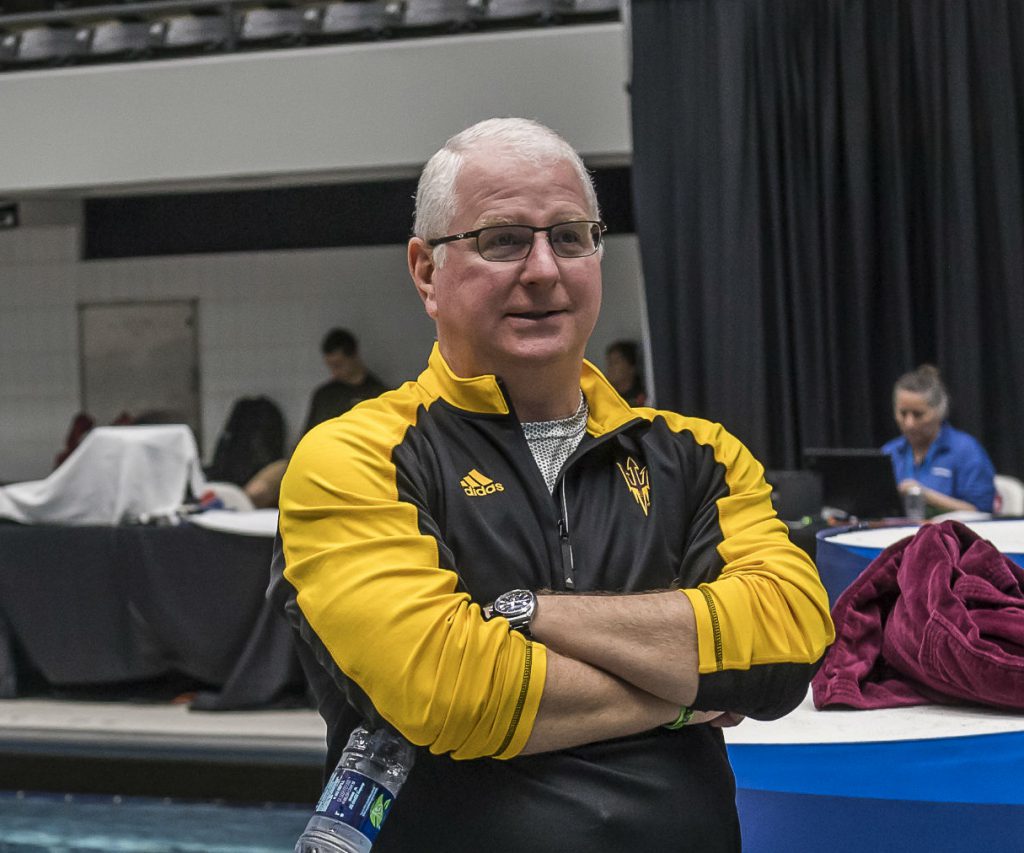
Champion’s Mojo Podcast (Bob Bowman)
In the latest edition of the Champion’s Mojo Podcast, which has partnered with Swimming World to share the insights of some of the sport’s leading figures, coach Bob Bowman lends his thoughts on a variety of topics. The man who molded Michael Phelps into the greatest Olympian in history is now the coach at Arizona State University and has his athletes working toward the 2020 United States Olympic Trials.
*************************************
Bob Bowman believes that the process is what sets one up for inevitable success. In this lively interview, Coach Bowman talks with Champion’s Mojo Hosts Kelly Palace and Maria Parker and shares some of his own routines for success and talks ASU culture and the five pillars he’s using for creating an environment for success. You may be surprised to learn that Bob himself is swimming again for the first time in 30 years, believes in “going with the flow,” appreciates those coaches who have mentored him and the creativity in coaching. Read on to find out what he says is “the best thing” in his life today.
Below is an abridged Q&A of the interview with Bob Bowman. You can listen to the full podcast, episode #45, here or at www.ChampionsMojo.com.
In 2019, Champion’s Mojo recorded 45 shows. Listeners ranked the Top Ten Interviews of the year and Bob Bowman’s interview was selected as #1. Here are the other Top Ten interviews, which can be found on the Champion’s Mojo website: #2 Lewis Pugh, #3 Natalie Coughlin, #4 David Marsh, #5 Mel Stewart, #6 Jack Bauerle, #7 Madisyn Cox, #8 Cody Miller, #9 Ella Eastin, #10 Summer Sanders.
The Bob Bowman Interview:
Champion’s Mojo: Bob, if 20 years ago someone had told you that you were going to do all the things I listed in your introduction, among them Olympic Head Coach and coaching swimmers to a combined total of more than 30 Olympic gold medals, what would you have said?
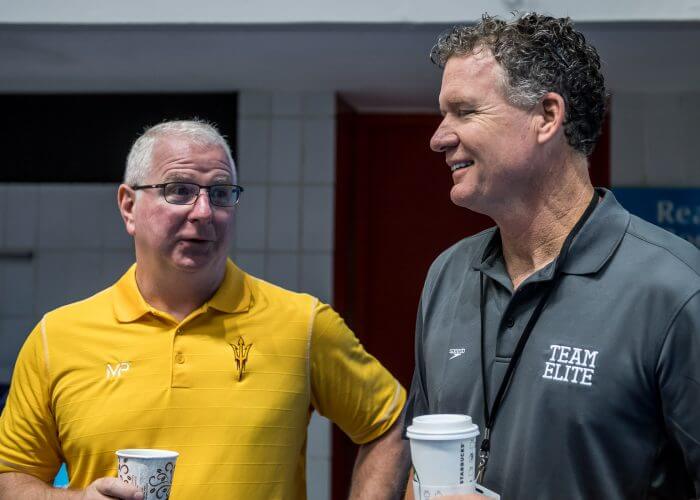
Photo Courtesy: Peter H. Bick
Bob Bowman: No way. It sounds kind of crazy when you say all that stuff. But, you know, I was just a hard knocking swim coach trying to learn how to do it. The early years I just worked as hard as I could. I was frustrated almost all the time because I wasn’t getting anywhere fast enough. And I still remember a time where my biggest career goal was to have somebody qualified for the junior Nationals. I thought I would never get there, but that’s just amazing.
Champion’s Mojo: So if you if you could write a letter back to your 21-year-old self, just graduating from Florida State, what would it say?
Bob Bowman: I would say take a little better care of yourself and be a little patient. There are many good things that happen in life when you just sort of let it flow, you know? You know, I can go back to many things in my life that have just seemed to kind of happen by coincidence, but they were really because I had put myself in an opportunity where some good things can happen. And there are some things that you just have to let happen. You can’t make it happen, right?
Champion’s Mojo: Initially things didn’t happen as you wanted with your coaching career. Can you share the story of when you first started coaching and you had a couple of guys that were training with you that had a shot at making the Olympic Team and they bolted?
Bob Bowman: Yeah. I was coaching in Napa, California, and I had just taken over as the head coach of the club there. And there’s Eric Wunderlich, who was a very good swimmer at the time. He had swum at the University of Michigan and had come out to train with me and the other was a good swimmer from Auburn University, Lian Mull. Eric had won the Pan Pacs (in the 100 breaststroke) the year before the Atlanta Olympics, was the fastest American in that event, and Lian had won the World University Games (in the 400 individual medley) and was third at Pan Ams behind Tom Dolan. So these guys had a shot at the Olympic Team
After about a year with me, they came in and said, you know, we love the swimming here, we love the coaching, but we just can’t train with these little kids. They’re the only two adult guys with all these little kids. And so they went back to Michigan. I was not in a good place for a long time after that. And I basically decided that, you know, I’ve worked really hard at this. I have given everything I’ve got. But obviously, if it was going to happen, it would have already happened by now. So I’m done.
I thought about going back to school and was actually going to look at maybe being a veterinarian for race horses. So I called David Marsh at Auburn where they have a good veterinary program. I went down there, met with David and I was going to be a Graduate Assistant and coach the distance swimmers. But then Murray Stephens from North Baltimore Aquatic Club offered me a job and called and said, how much is Auburn going to pay? I said, 10,000 bucks. He said, I’ll pay you 35,000. I said, I’ll be there next week.
So that’s how I ended up in North Baltimore Aquatic Club. That was one of those fortuitous things where I would never have expected it to end up the way it did.
Champion’s Mojo: So you almost quit coaching. What do you think the lesson is from that?
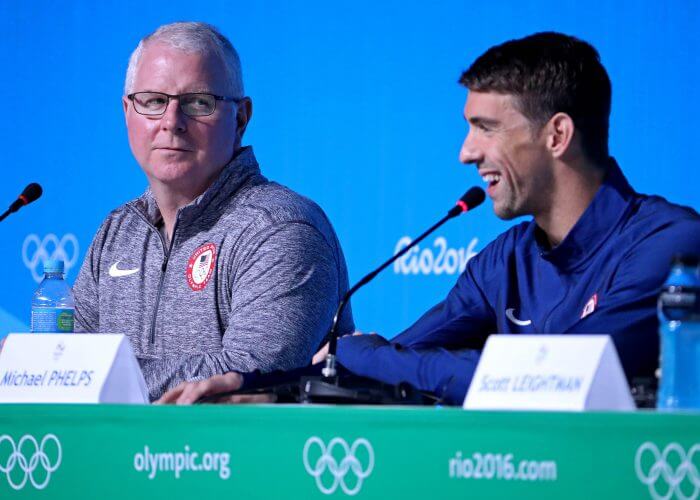
Bob Bowman with Michael Phelps at Rio 2016 – Photo Courtesy: Peter Casey-USA TODAY Sports
Bob Bowman: Well, I don’t want to get too philosophical with you, but I’ve done a lot of reading on this kind of stuff. I read a good book called The Surrender Project by Mickey Singer. I highly recommend people read it. I’m not going to get into a lot of Eastern philosophy stuff. But one of the things they talk about is, live in the current moment. Surrender to it instead of always trying to fight things and make something happen. Go with the flow of the way your life is going and you’ll sort of naturally go in the direction that you’re supposed to go. I’ve talked quite a bit to my staff and those I’m close to about surrendering to the universe. What’s opening up right now? This is where we should go. So I think that’s part of it.
Champion’s Mojo: How do you deal with pressure? What got you through that run to the eight medals in Beijing and daily knowing that you’re walking on the balance beam for this?
Bob Bowman: I think it was the advantage of knowing that this just wasn’t like a week in China. This was 12 years of Michael’s career leading up to it. We had worked step by step by step to get him to a point where he might have the opportunity to do this thing. And one of the things that I think made it successful, is that I knew he was completely prepared. There was not one more thing we could do. And then let the chips just fall where they may.
We can’t determine how fast other people are going to swim. We can’t determine how the French are going to swim their relay. We can just have him as ready as he can be. And we were there and I told him beforehand. I said, you know, we hardly ever talked about winning eight, but I said, if somebody is going to win eight, you’re going to have to be 100 percent prepared, which we are. And you’re going to have to get a little bit of luck, because winning all the relays presented a lot of variables. We did get lucky twice, to be honest. And after that first relay, I turned to Frank Busch and said, well, we used up all our luck. We’re gonna have to do it on our own now because that’s as lucky as you can get.
Champion’s Mojo: How did you personally deal with your stress that week?
Bob Bowman: In Beijing, I was much more experienced at the whole process, which helped with my stress. We had it completely mapped out. So we had been rehearsing it beforehand. We knew the timing between the events we had done, the triples we did. So there was a whole list of things that we were focused on. But this time, we were much more automated. So I didn’t have to worry about things as much.
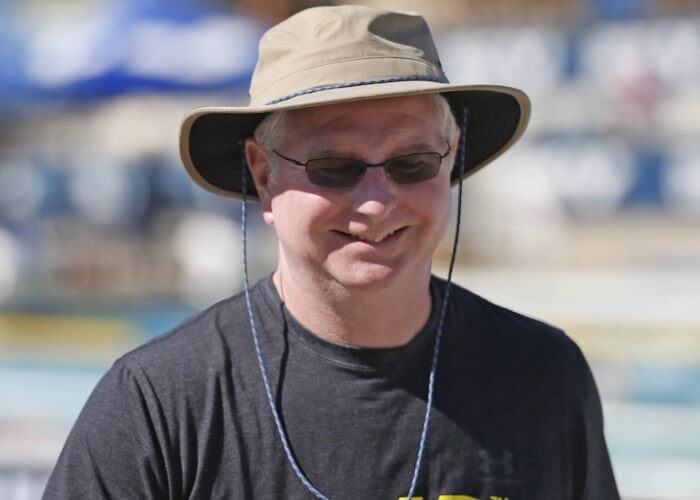
Photo Courtesy: Robert Stanton/USA Today Sports Images
What I personally did was, I actually I took 10 minutes every morning, when Michael was just stretching, and I would go into the pool and look around and tried to drink everything in. There was so much that I wanted to remember it and I actually really remember everything about it. It’s crazy when you kind of consciously do that.
That actually had a calming effect on me. I was like, wow, this is super cool. Like, not many people are ever going to be in this position. We’re here. Things are going OK. Hope today goes well. You know, we’re really trying to take it moment by moment and not think ahead or look back on what we did.
Champion’s Mojo: So it was being in the present moment?
Bob Bowman: Yes! Another book recommendation, that I love is The Power of Now. I just read that three times.
Champion’s Mojo: What else helped your stress in Beijing or at other big meets?
Bob Bowman: I had a daily routine. I usually worked out on the elliptical. They had a gym there. I would alternate weights or cardio. I try to do that at all meets. It really helps. And also, it just keeps me from sitting around and letting my mind go crazy about things. And other than that, I tried to get to know a lot of great people on that team. Mark Schubert has been a good mentor for me. He was kind of helping us go through it. Frank Busch and Jack Bauerle, my great friends, were there too. So it’s fun to just hang out with them and they kind of keep things light. Eddie Reese was the head men’s coach, so I relied on him to help me de-stress too.
Champion’s Mojo: What were some examples of lessons that you and Michael practiced that you saw come to fruition?
Bob Bowman: I could see several of the lessons that I had worked on with Michael along the way were being used. He met our time schedule to the minute in Beijing and was always where he was supposed to be when he was supposed to be there. At prior Olympics he didn’t always bring everything he needed, like a suit or something. In the 2000 Olympics he didn’t bring his credential one time and only got to the final 30 minutes before he swam. So we grew up a lot in those years.
Champion’s Mojo: I know that you believe deeply that you have to be emotionally engaged in your goals. How do you come off of your success with Michael, the highest high that a swimmer or a swim coach can possibly achieve, and have this emotional energy to go forward?
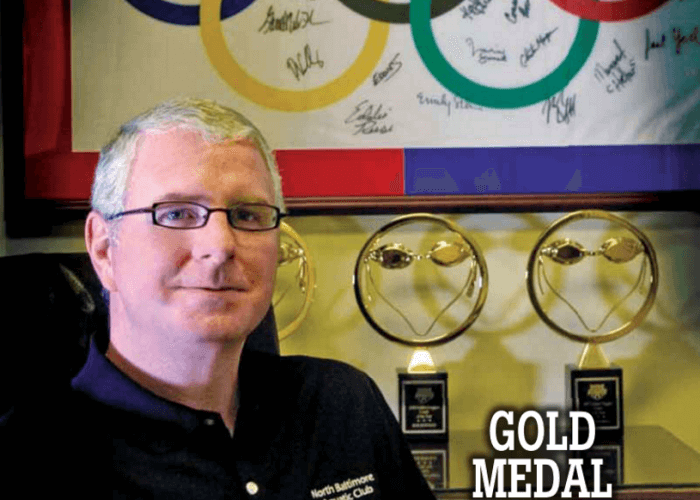
Photo Courtesy: Swimming World Magazine
Bob Bowman: I just love practice! I love practice. I’d probably go another 10 years if I didn’t have to go to swim meets. (laughing). But I love the day to day with these kids. That gets me out of bed. I have a great group of athletes at Arizona State University. A great staff that I love to be around. And every day we’re helping them take that next step. And honestly, the process is the same as getting Michael to take his. It’s just like taking more steps. So that’s what I love about it. I just love working with these young people on a daily basis.
Champion’s Mojo: What is the culture that you’re creating at ASU?
Bob Bowman: Great question. A culture of excellence, to make it very simple. I know that sounds cliche, but that’s what we try to do. It’s a culture of personal accountability. There are five things that we ask kids to do. Every year we have the same talk. Now the seniors know what they are and they kind of say it with me.
One: we have to have honesty, whatever we do. I’m going to be very straightforward with you. Good, bad, ugly or in-between. You’re never going to have to worry about where I stand. You’re always going to know. And I’d like the same from you, because that’s the foundation of any healthy relationship, right?
Two is accountability. Your accountability. You’re accountable for your swimming. You’re accountable for what you do away from the pool. You’re accountable for your schoolwork.
Honesty and accountability to me are integrity. Put those two together. So that’s very important in our program. You’re going to get a lot of feedback. Some of the feedback you’re not going to want to hear. But that’s my job. And I’m not doing my job if I don’t tell you. Some things that you need to know, but maybe don’t want to know. I’d like for you to tell me some things, that maybe, I don’t want to hear that I need to hear.
The third one is competitiveness. I want you to be competitive in what you do. I want you to care about that aspect of it and not in a zero sum way, not like you get something somebody else doesn’t. Competition means striving together, if you look up the Latin root. Make yourself better by competing in practice and in everything we do.
The fourth one is resiliency. You know, it’s never a straight line to success. You get knocked down all the time. The only thing that matters is that you get up and try harder, do better, learn something. So we have to be resilient.
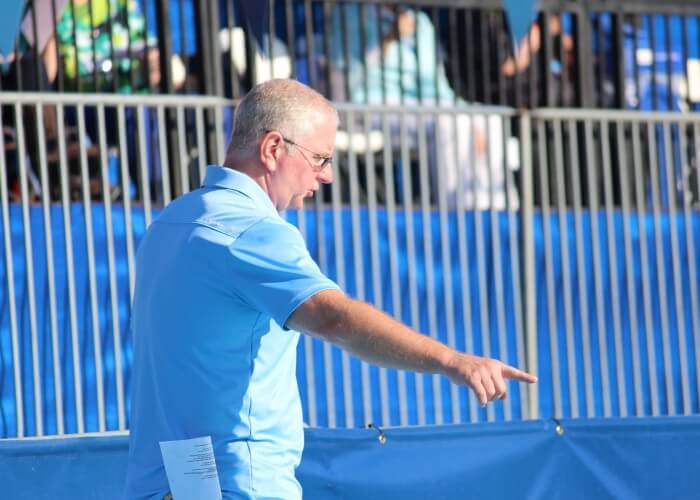
Photo Courtesy: Griffin Scott
And then fifth and finally, everyone in the program has to show respect. You have to have respect for the process of what we’re doing. Respect for your teammates, respect for your competitors, your coaches, your parents, yourself. What you do with and to your body. You know, there are a lot of things going on out there. And if you approach it with an attitude of respect, you’re gonna be the kind of person that we want you to be, the kind of athlete and student that you want to be.
With those we want to create an environment where success is inevitable. If you come to ASU and you buy into what we’re asking you to do and you give it your best effort and you do these things, you’re going to be successful.
Champion’s Mojo: Great! You mentioned many fellow coaches today, tell us about your mentors.
Bob Bowman: All of them (I mentioned) have been my mentors and then some. Gregg Troy is a huge mentor of mine. I happened to start coaching in Tallahassee, Florida, and he was the best friend of Terry Maul, another mentor of mine who was the head coach in Tallahassee. They were best friends. So we would go to meets. And I spent a lot of time around Gregg, and he’s definitely someone who was a kind of a rival of mine, I guess you would say. I just heard a podcast today where Simon Sinek talks about having a worthy rival. Someone who basically mirrors. They’re very good at the things you’re weak at. But you push each other. And I feel like Gregg and I are a perfect example of that. Like when Ryan (Lochte) and Michael (Phelps) were both going into Beijing. Certainly worthy rivals on both sides. But he’s someone I could always go to for an honest opinion,
Teri McKeever is another mentor of mine. You know, Teri and I sort of came up at the same time. She had Natalie (Coughlin). I had Michael and we both kind of grew up on the National Team together. And she’s someone that I very much trust and value her opinion. And she does her program completely differently than I do mine, which is amazing. And I think that’s a great thing about our sport. It’s the individuality and the creativity that different coaches have, they come up with something that fits their situation, their swimmers, their personalities, their strengths as coaches. And to do that and still have similar success, I think is one of our best things in America.
Champion’s Mojo: It’s a tough job coaching a combined program at the D-I level. What do you do on a daily basis regarding your routines and rituals that keep you healthy mentally and physically?
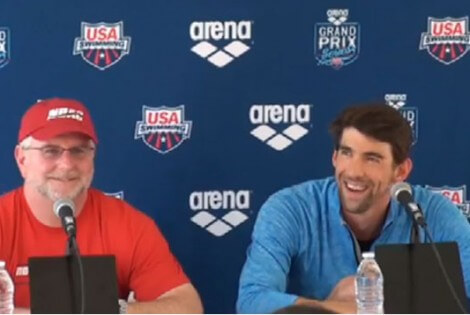
Photo Courtesy: Swimming World
Bob Bowman: Well, I’m actually doing way better on that. Every day I get up at the same time, about 4:45 a.m. I’m an early riser on most days. I’m usually up before the alarm because I’m on a schedule. I go to bed about 8:30. It’s a good routine. Monday, Wednesday, Friday. I go to practice at 6:00 until about 8:00. After that, I will lift weights with our ASU strength coach, whose comes up with the program for me and I go in there and do that. Sometimes I don’t like that.
On Tuesday, Thursday, I don’t have morning practice. So I immediately go to a pool near my house and I swim myself. I’ve just started to swim recently and it’s been amazing. I can’t believe that I went for 30 years without swimming. And I started with 500 yards and now I’m up to 2500 a couple of times a week.
Champion’s Mojo: Now that you are swimming, what’s your 100 pace?
Bob Bowman: Oh, probably 1:30 when I’m working really hard. It’s about 1:30.
Champion’s Mojo: Do you use fins?
Bob Bowman: No, I don’t use fins. I pull. I’m a good puller. So the bottom line is every day except for Saturday, I exercise. I take one day off a week.
Champion’s Mojo: Anything else you’ve been doing for your health?
Bob Bowman: I’ve been experimenting with intermittent fasting and I really like that.
Champion’s Mojo: We just did a podcast on Intermittent Fasting. How are you liking it?
Bob Bowman: It’s very easy with my lifestyle, because I go to bed early. I stop eating at 6:30 and I don’t eat until noon the next day. So most days I can get that 16 hour window of not eating. I have better energy and honestly I’ve learned that maybe eating is just a habit. I don’t feel deprived or anything. If you listen to Dr. David Sinclair he says it can reset your genes. It’s kind of an anti aging patch now.
Champion’s Mojo: What else do you do for your wellness?
Bob Bowman: I read. I just read a great book called Essentialism by Greg McEwan. I highly recommend it.
But really the best thing in my life, especially in the last three years, now is heading over to Michael’s house after practice to see my grandchildren. Maybe not every day, but probably three or four days during the week and then definitely Saturdays and Sundays. And I’ll play with my grandkids and then have dinner with them. And then that’s it, I go home. They know I have to leave at 7:00 so I can get to bed on time.
We talked about being in the present. When you’re with kids that age, you’re 100 percent present. I’m not thinking about tomorrow’s workout or how today went. All I’m thinking about is are they going to ride their bike off this curb?
Champion’s Mojo: Are you giving any swimming lessons to Boomer?
Bob Bowman: There are some swimming lessons. They have a nice pool. So, yeah.
Champion’s Mojo: Do you think we’ll see Boomer in a swim meet in the next few years?
Bob Bowman: I hope not. But he’s a very good swimmer. I wouldn’t characterize Boomer as 100 percent water safe, but he’s almost and he’s three years old. So that’s really good. That’s really young. And Beckett’s just starting.
Champion’s Mojo: What are your thoughts on the International Swim League and pro swimming ?
Bob Bowman: I think it’s great. I think it’s the n
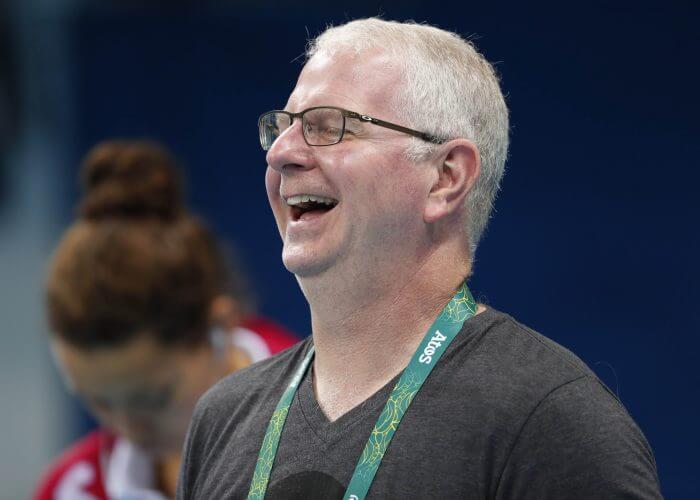
Photo Courtesy: Rob Schumacher-USA TODAY Sports
ext step in our sport. More and more people are swimming well beyond college. I think that in the bigger picture, we have to figure out how all of this fits into the FINA calendar, all of the other things that are out there, because I personally feel like the menu’s a little big right now. We need to kind of get more organized on when certain things are going to happen so that the athletes that are doing all this stuff can still do the consistent training that they need to do to improve. I just think there needs to be coordination. There are currently so many options.
Maybe swimmers should ask, are you making the current money at the expense of the big money later? There are tradeoffs. And I respect everybody doing that. And I have some athletes that are in the ISL. I have some that chose not to do it this time. But it’s been great for the sport. I think just from raising the profile of (the sport) it’s very good.
Champion’s Mojo: What do you think the biggest changes in the swimming world have been in your tenure that have really changed the sport?
Bob Bowman: Professionalism for sure. I think the introduction of being able to have professional swimming has definitely changed because so many people are staying in it longer. College swimming is not the end. It used to be the end. So I think that’s a huge change. I think next is technology, the suits. We’ve had so much that had to do with that. That’s been a big change. Those are probably the two biggest.
Champion’s Mojo: Is there anything I haven’t covered that you would like to cover?
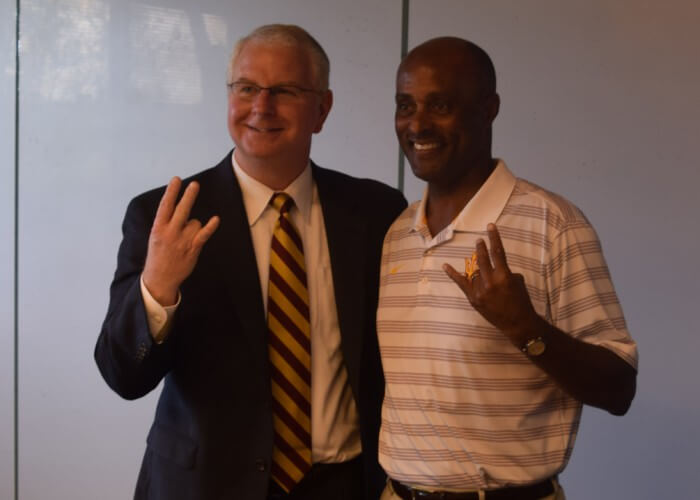
Bob Bowman and Arizona State University Athletics Director Ray Anderson. Photo Courtesy: Joe Johnson
Bob Bowman: People ask me all the time why I’m at ASU. There are so many reasons. Number one, it’s a world class university and a research institution. So many things are going on there that I could spend an hour talking about it, but I won’t. The main reason is the quality of life in Arizona is better than any place I’ve ever been. It is just an amazing place. The desert is a beautiful place. We have access to everything. We have pro sports. We have college sports. We have shopping. We have golf. You name it, we have it. It’s easy to get around. It’s laid out in a way that you don’t feel congested. It’s a vibrant community. And year round, you’re outside. And there’s really nothing better than that.
Champion’s Mojo: Well, Bob that’s a wrap. Thank you so much for spending time with us today and best of luck to you and your teams this year!
Bob Bowman: Thank you. It was great. It was fun. Thank you for having me.




Wow great read and picked up a few pointers thank you